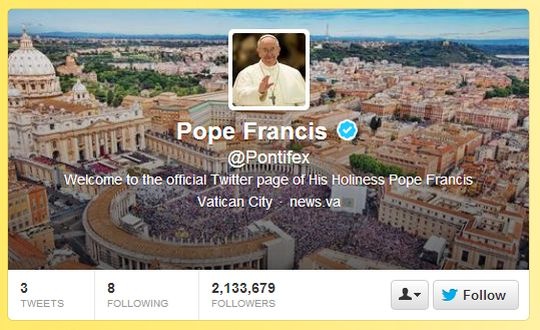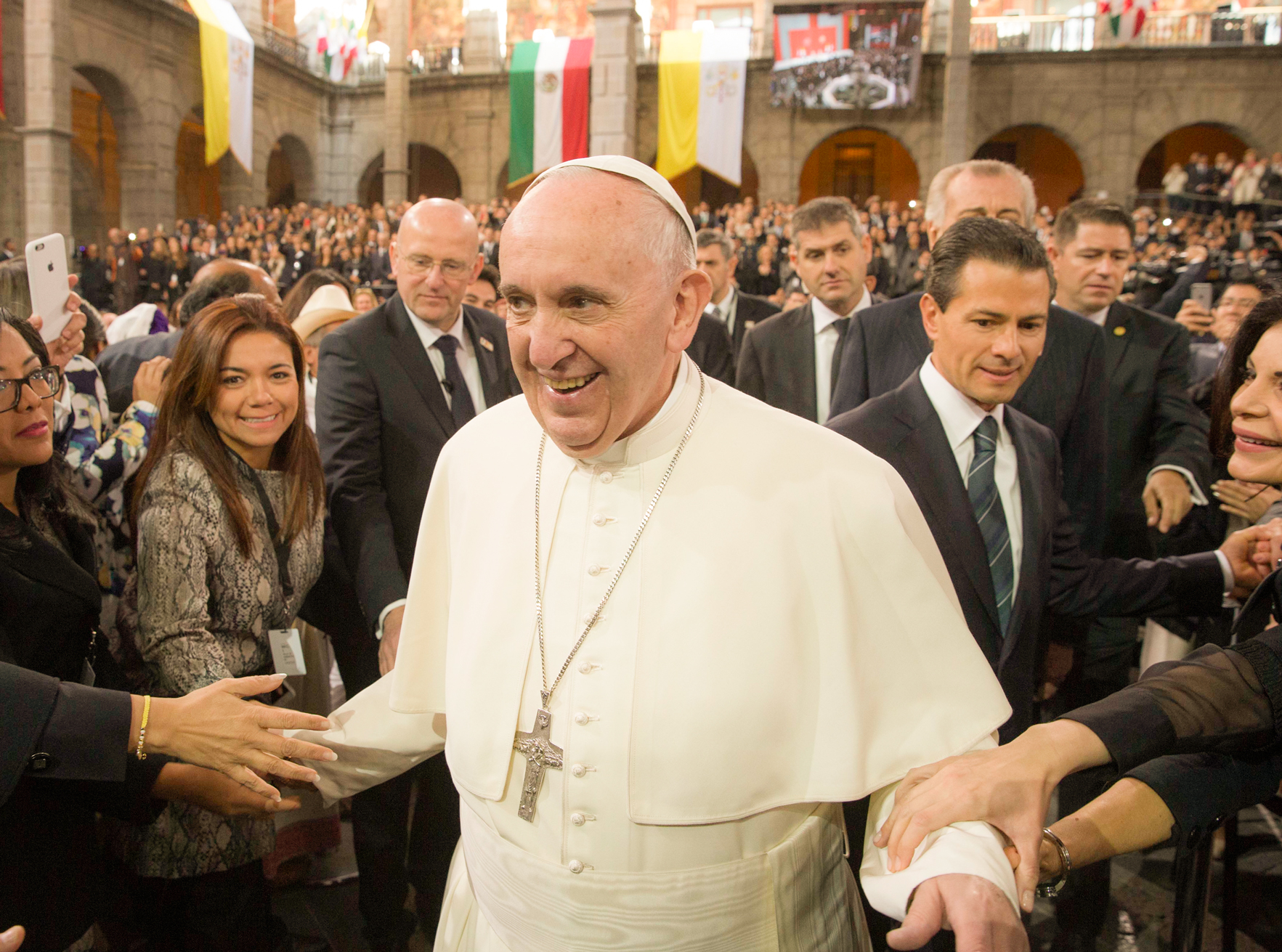The following is a guest post by Jim Caccamo of the Department of Theology and Religious Studies, Saint Joseph’s University, Philadelphia, PA.
For the past 10 years, I’ve been teaching an upper level course in technology ethics. Students learn fundamentals of Christian ethics as we hash through a host of cases like the collapse of the tunnels in Boston’s Big Dig, data mining, copyright and downloading, sexting, privacy, online speech, hacktivism, and post-humanism. We have a lot of fun in the class, and students are really confronted by the moral questions that they had never seen in many of their everyday activities. Interestingly, students seem to think they are getting away with something, taking up class time to argue about the ethics of image-management on Instagram. All the while, they are engaging in deep work with questions of human dignity, marginalization, power, and love. Really, I’m probably the one who is getting away with something!
One of the tricky things about the course, though, is that the cases need constant update. The tech world never stops, and so I have to do major revisions to half of the cases every semester. Two summers ago, we were half-way through the course when the Edward Snowdon/NSA spying story broke. In an instant, our discussion of surveillance shifted! And so it has been my consolation that the ethics material has remained constant. I don’t really need to update the material we read on the virtues and principles of the Christian life, nor the articles on how Catholics, Protestants, and Amish approach technology. That stuff doesn’t really change.
Or at least, it didn’t until last week.
In the space of about 16 paragraphs that directly comment on technology within Laudato Si’, Pope Francis makes a couple of substantial—even fundamental—changes through in the way that technology is understood within Vatican writing. The changes are so well integrated into the text and so natural, they are also easy to overlook.
Thinking about Pope Francis’ portrayal of technology, I’d offer two things that seem to me to mark significant shifts in either basic content or normative emphasis within Catholic Social Teaching on technology. In these observations, I’ll steer clear of the comments that the pope makes on biomedical technologies, as they are probably best understood within the broader context of the discourse biomedical ethics. Instead, I’ll consider technology in general, in light of the largest single body of Vatican writing on technology, that on social communications. Since 1936, the Vatican has promulgated more than 210,000 words on communication and the technologies we use to communicate, and that literature provides a focused summary of the perspectives on technology as it is discussed more broadly across Catholic Social Teaching.
1) Individual technologies are not gifts of God: This may seem kind of obvious. However, this idea contrasts the position articulated consistently from the earliest encyclical on communication technology that “technical inventions…though they spring from human intelligence and industry, are nevertheless the gifts of God, Our Creator, from Whom all good gifts proceed.” (Miranda Prorsus, Introduction and section 1) Indeed, the Apostolic Instruction Communio et Progressio asserts that “media”—meaning both content and technology—have an “allotted place in the history of Creation, in the Incarnation and Redemption” because “in accordance with His providential design, [they] unite men in brotherhood and so help them to cooperate with His plan for their salvation.” (Communio et Progressio, 15, 2) Who knew God loved TV so much?
Instead, quoting Saint John Paul II, Francis asserts that “science and technology are wonderful products of a God-given human creativity.” (Laudato Si’, 102) Throughout the twentieth century, the fundamentally good nature of technology was difficult to critique any given technology from within Catholic social teaching because it originated in a good God. That critique is easier to make when technology is born of human creativity that, while ultimately originating in the work of God, is subject to human sin and failure.
2) Technologies are not morally neutral instruments: Again, while this may seem like an obvious point, I can’t state how significant this shift is. In light of the previous idea, Catholic social teaching on technology has generally argued that technologies are not to be judged as good or evil (with the exception of nuclear weapons). Rather, specific uses of technologies are judged good or evil in light of the consequences of their use or, in the case of communication technologies, the particular messages conveyed. A perfect example of this perspective can be seen in 1997’s Pontifical Council for Social Communications document Ethics in Advertising:
There is nothing intrinsically good or intrinsically evil about advertising. It is a tool, and instrument: it can be used well, and it can be used badly. If it can have, and sometimes does have, beneficial results…, it can, and often does, have a negative, harmful impact on individuals and society. (9)
Indeed, if we were to describe Vatican writing on technology in light of the various philosophical models of technology, it would be “instrumentalism.” It is an approach that makes a certain amount of sense—the material aspects of an action are not the only parts that have moral species—and it did open space for the development of many means of communicating that were seen by some as approaching inherently evil (for instance Philadelphia’s Cardinal Dogherty’s ban on film in the 1930s).
That being said, Pope Francis could not have stated his disagreement any more starkly:
We have to accept that technological products are not neutral (107)
I know that we’re supposed to say that nothing changes in Catholic social teaching, but rather develops as popes nuance and build upon each other’s work. And, yes, you can find some minor antecedents in previous writing (e.g.: Pope Benedict XVI, “Social Networks: Portals of Truth and Faith; New Spaces for Evangelization,” 5). But it is difficult to read Pope Francis’ words as anything other than a distinct change. (It is telling that of the 11 notes in the 13 paragraphs distinctly on technology, only two reference previous Vatican writing on technology.)
So, if this is a change from instrumentalism, to what is it a change? Two things strike me.
First, in continuing the sentence, Pope Francis moves toward a broader recognition of the ways in which our technological choices are embedded in broader questions of social convention, values, and power relationships:
for they create a framework which ends up conditioning lifestyles and shaping social possibilities along the lines dictated by the interests of certain powerful groups. Decisions which may seem purely instrumental are in reality decisions about the kind of society we want to build. (107)
Robotics and automation are intertwined with the productive needs of business, social media is intertwined with social valuation of celebrity and image, surveillance is intertwined with desires for safety and control. This recognition of the power of broad social forces on the particular (referred to as cultural or social materialism within philosophy of technology) fits in well with CST’s general see-judge-act approach, yet has been generally absent in work on technology.
Second, as the section on technology continues, Pope Francis also moves toward a recognition that the structures of technology itself influence the way that we live, irrespective of the particular uses to which we put a given technology. As he notes technology and science, as ways of thinking and acting, utilize “specialization” and “fragmentation of knowledge” as means to progress. (110) Now, it is not entirely clear here if Francis believes that specialization and fragmentation of knowledge are necessary features of science and technology, are useful ways of constructing them, or are simply the way that we happen to do things today. But in any case, he suggests here that engaging in the practice of technology creates habits, not merely of action, but of thinking about the world. Indeed, to really succeed in technology and science, we are encouraged to become single minded: really get to know your device, your search engine optimization, or the specifics of the metal you are developing. Engaging technology and science changes us in the engagement. This recognition of the power of the objects we work with (referred to as determinism within philosophy of technology) has been generally been resisted in CST as a limitation on our human freedom to determine the ends of technology. But Pope Francis seems willing to admit that technology doesn’t always lead to freedom.
The Upshot
As I’ve written on Catholic social teaching, I’ve always been a bit torn. In many places, the popes have written beautiful words that speak to some of the deepest longings and greatest problems in the world today. Laudato Si’ continues the best of those themes, even expanding them to connect with his broader vision of the cosmos. Communio et Progressio spoke eloquently of the goal of media and communication technology as ultimately being the full communion of human beings. That communion required knowledge of one another and interchange between persons around the globe. But that knowledge and interchange could only bring communion when it promoted authentic human development and increased the common good. Seeing Pope Francis integrate technology into a broader picture of liberation, development, and common good is fruitful and a helpful reminder that technology is not some separate sphere of our lives, but rather integral to who we are and, indeed, who we have always been.
Yet, Vatican thought on technology has also struck me on many occasions as both methodologically and practically naïve. (And I’ve not necessarily been shy about that complaint, presenting my critiques to folks from the Pontifical Council for Social Communications.) It always felt a bit like the phrase “guns don’t kill people, people kill people”: yes, that’s true, but kind of misses some really, really big things.
This encyclical goes a long way to expanding the sophistication with which the Catholic tradition can engage in the process of understanding and assessing the many technologies we use today. If we are to say—as Francis very much did—that technology is to be celebrated, we need to understand exactly why we are celebrating it, and why we might hold off on celebrating at times. Like any other human endeavor, technology is fraught with the complexity that comes of our being people who are not merely spiritual, but embodied and social, aiming at development, but moving toward it in increments. Including the nature of our technologies and their complex relationships with society makes the job of assessing technology more complex. But it will also yield a more full understanding of what it means to use technology in a more human way.
In the end, then, I will need to do some work to update the reading list for Tech Ethics this Fall. But I have a feeling the gains we make will pay great dividends.






Thanks so much for this great post, Jim! I wish I could take your class. I especially appreciate your connection between theological anthropology and social justice.
I would be very interested in hearing you speak to how the Pope, or Catholic teaching more generally, might address the following concerns.
To me, the central issue of the modern world appears to be that knowledge development is accelerating, a process which tends to feed back on itself and become exponential in nature. And as knowledge grows, so does our power of course.
It appears that we are increasingly in a position which might be compared to a child which has been given a case of scotch, keys to the car, and a loaded handgun. That is, we are ever more powerful, at an ever accelerating rate, but perhaps only incrementally wiser at best.
An example of our very modest wisdom may be that it’s quite rare to find conversations that address the ever widening gap between our power and wisdom in a serious and sustained manner.
It’s goes without saying The Church will advise us to develop our wisdom, but is there any chance we can “grow up” fast enough to successfully manage all the new powers increasingly raining down upon our heads?
Does the Pope speak to this directly? And/or other Catholic writers?
Many thanks for any education you may be able to provide on such topics.
Thank you so much for this post! Speaking as a scientist, this gives me a lot of food for thought. Many people, including scientists ourselves, often see scientific and technological progress as inevitable. We don’t often recognize how much our individuality and humanity shapes the science itself. Given that ability for us to shape our own knowledge and capabilities, it only makes sense that there would be a moral dimension not only to the means we use to develop these tools and to their application but to these tools in and of themselves… but somehow I’ve never realized that before.